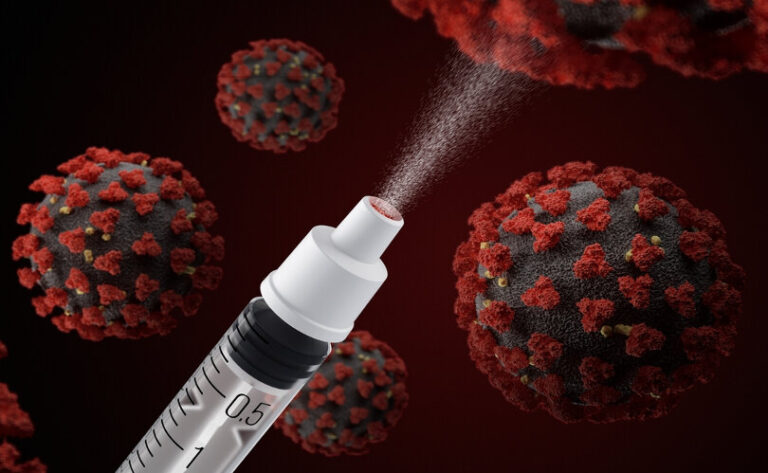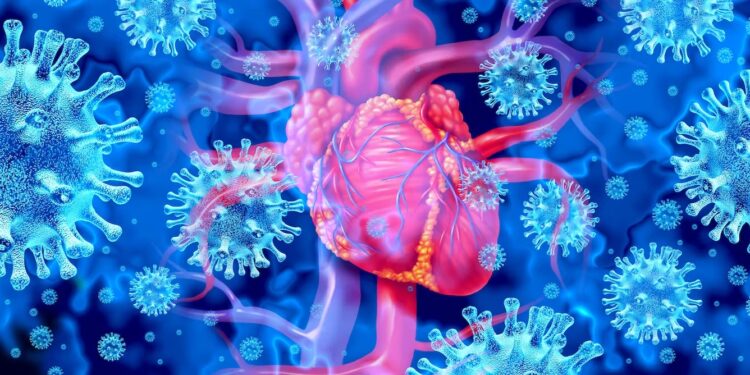How the COVID Vaccine Could Harm Your Gut, Leading to Brain Fog and Autoimmune Disease

Diarrhea, constipation, and bloating are common issues that affect two-thirds of the population.
While gut problems are frequently dismissed as the result of poor diet and lifestyle choices, they may also be an indication of damage caused by infections such as COVID-19 and COVID vaccination.
Dr. Keith Berkowitz, an internal medicine physician who has treated 200 COVID-vaccine-injured patients, told The Epoch Times that gut problems were common among long-COVID and post-vaccine patients. However, patients frequently fail to bring up these concerns.
Furthermore, people may be unaware that symptoms like fatigue and brain fog can be caused by gut issues, according to internist Dr. Yusuf Saleeby of The Epoch Times.
The Gut Is Involved in Everything
Diabetes, obesity, heart disease, dementia, cancer, infections, autoimmune diseases, and even reproductive diseases are all linked to poor gut health.
The health of the gut is frequently dependent on its microbiome, which is made up of 100 trillion microbes inside the large intestine.
A healthy microbiome contains a diverse population of microbes, including numerous beneficial bacteria. These microbes produce chemicals that are required for metabolism, nutrition, immunity, and organ communication. They also aid in the maintenance of the mucous layer in the gut, which prevents infections from entering through the gut cells.
Poor diet, lack of sleep, environmental toxins, alcohol and drugs, infections, and chronic diseases can all harm the microbiome by depleting it of beneficial bacteria and replacing them with pathogenic bacteria.
A Significant Improvement Following COVID Vaccination
Infections with the COVID-19 virus have been shown to harm the gut microbiome and are associated with compromised mucous layer integrity, resulting in gut dysbiosis—a microbiome imbalance.
According to reports, the COVID-19 mRNA vaccine is also linked to decreased biodiversity in the microbiome.
Dr. Sabine Hazan, a gastroenterologist and the CEO of the genetic research lab ProgenaBiome, discovered that test results from many vaccine-injured patients a month after vaccination show a lack of the probiotic Bifidobacteria. Dr. Hazan’s lab was the first to report the entire genome sequence of the SARS-CoV-2 virus using patient feces.
Bifidobacteria are bacteria that belong to the genus Bifidobacterium and are among the first microbes to colonize the gut. They are among the most common probiotics and are thought to benefit the health of their hosts.
“Right now, we’re seeing a persistence [of Bifidobacteria loss] in some patients, not a lot of patients,” the doctor said. “However, if people are suffering as a result of the vaccine, they must be investigated.” They can immediately begin a clinical trial… We’re working on markers to identify vaccine-injured patients, and we’re looking for a signature microbiome in vaccine injuries.”
Since then, her research team has been following 200 vaccine-injured patients. She has seen significant reductions in Bifidobacteria and other species in some patients. However, there have been a few instances where Bifidobacteria levels have risen.
Dr. Hazan believes that the spike proteins on the surface of the SARS-CoV-2 virus, which are produced in human cells following vaccination, kill Bifidobacteria in the same way that the virus can infect and kill good bacteria.
Bifidobacteria deficiency has been linked to diabetes, cancer, Lyme disease, and Crohn’s disease, according to research.
Loss of beneficial microbes such as Bifidobacteria, like the COVID-19 virus, may cause gut dysbiosis, which is directly linked to poor gut health and associated diseases.
However, in clinical diagnosis, gut dysbiosis is poorly defined.
“In the clinical research looking at patients, we don’t have that definition yet,” Dr. Hazan went on to say. “There is no guidelines to say gut dysbiosis is equal to this (specific thing).”
Dr. Hazan’s previous research in COVID patients demonstrated that Bifidobacteria abundance is related to the severity of COVID-19 disease. Patients with higher levels of Bifidobacteria in their gut had mild or asymptomatic disease, whereas patients with low or no Bifidobacteria had severe disease.
The Treatment of COVID-19 Injuries May Begin in the Gut
When restoring the microbiome, many factors must be considered. Doctors must ensure that the right microbes are cultivated, that this occurs in the correct location, that it does not disrupt other microbes, and that the gut can support the new microbes being colonized, according to Dr. Hazan.
Restoring microbes in an unhealthy gut environment could be compared to planting an apple tree in sand.
“It’s forensics of the gut microbiome,” she went on to say.
Helping patients with COVID-19 injuries, according to Dr. Saleeby, often begins with the gut, because the gut is what allows patients to absorb prescribed drugs and nutraceuticals.
He used low-dose naltrexone as an example, which is a common treatment for long COVID and vaccine injuries.
“Low-dose naltrexone (LDN) will help the inflamed bowel and/or Crohn’s disease and/or ulcerative colitis, and when you start repairing the gut, you’ll find that the LDN is absorbed better.” As a result, the LDN dose may change,” he explained.
Small intestinal bacterial overgrowth (SIBO) can occur in gut dysbiosis and interfere with treatment. Patients may also experience worsening symptoms after beginning therapy. Dr. Saleeby explained that many of the first-line therapies used to treat COVID-19 vaccine injuries work by clearing spike protein and increasing the body’s ability to flush pathogens. This can cause the immune system to attack the bacterial overgrowth in the gut, resulting in a massive accumulation of dead microbes in the body.
The body perceives these dead pathogens as a threat, resulting in a rapid inflammatory response and an increase in symptoms.
Dr. Saleeby suggests reducing treatment dosage and supplementing with anti-inflammatory therapies such as hydration therapy, saunas, and Epsom salt baths to make these reactions more tolerable.
Dr. Berkowitz also has patients who are unable to tolerate standard postvaccination therapies. His patients, on the other hand, show signs of an overactive nervous system, which he suspects is due to neurotransmitter depletion caused by the loss of beneficial bacteria.
After receiving hydration therapy and nutraceuticals that help calm the nervous system and rebuild the gut microbiome, these patients become much more tolerant of postvaccine treatments.
Neurological Issues as a Result of Gut Damage
Drs. Saleeby and Berkowitz believe that the damaged gut may contribute to their patients’ brain fog, fatigue, and other problems because the gut and the brain are linked through the nervous system.
Gut issues have long been linked to neurocognitive deficits.
Some people, for example, develop severe brain fog “within 30 minutes” of eating a piece of bread because they are gluten-sensitive or have celiac disease, according to Dr. Saleeby.
Neuroinflammation caused by the gut could explain why patients with gut issues frequently develop neurocognitive issues. The gut-brain axis connects the brain and the gut extensively. When patients with gut problems consume certain foods or chemicals that cause disease, the gut may produce inflammatory chemicals that can enter the brain.
Another cause of neurocognitive impairment is neurotransmitter depletion. Many gut microbes use dietary nutrients to produce neurotransmitters. In dysbiosis, some of these microbes are lost, and the gut becomes less capable of absorbing nutrients for use.
As a result, neurological and cognitive issues may arise. Neurotransmitters, which are used in the brain, are also produced in the gut. The gut produces 95 percent of serotonin and 50 percent of dopamine, respectively.
The majority of neurotransmitters produced outside the brain are unable to cross the blood-brain barrier or be utilized by the brain. Nonetheless, research indicates a direct relationship between mental and cognitive health and microbiome health.
Dr. Berkowitz has noticed a decrease in gamma-aminobutyric acid (GABA), which is produced by bacteria in the gut, including Bifidobacteria. He believes that a lack of GABA in the brain—an inhibitor that calms the nervous system—is the cause of many patients’ overactive nervous system symptoms.
He treats these patients with magnesium and melatonin, both of which stimulate GABA, as well as bovine colostrum, a milky fluid that seeps from cow udders in the days following birth. Bovine colostrum has shown promising results in both animals and humans in repairing gastrointestinal damage. Dr. Berkowitz discovered that by using these therapeutics, patients’ overactive nervous systems seemed to calm down, improving their symptoms.
“People describe their system going 100 miles per hour,” he says, and once that is calmed down, the body can repair itself. “Repair doesn’t happen when the body’s in a stress state … [since all the body’s] resources are focused on just survival.”
Autoimmune Conditions Caused by Gut Damage
Doctors treating vaccine-injured patients have reported similar findings. Gut problems have long been associated with autoimmune diseases.
Autoimmune issues typically manifest as leaky gut, also known medically as increased intestinal permeability. The mucous layer that protects the gut from microbes is broken down in a leaky gut, and microbes can then infect the gut lining and nearby blood vessels.
“If [the gut lining] is disrupted, it’s kind of like [breaking down] a castle wall,” the doctor said. “If it gets breached, then the enemy can get in.”
Infection occurs if a virus or bacteria enters during this stressful time of invasion. If the invader is innocuous, such as a peanut or a harmless chemical, an allergic reaction occurs instead. The body begins to attack these foreign yet harmless antigens, potentially harming itself and leading to autoimmune disease.
Dr. Berkowitz has discovered that many of his patients with overactive nervous systems and gut issues also have autoantibodies, indicating a possible autoimmune disease.
“Nerve pain, fatigue, muscle and joint issues are probably the most common issues [with these patients],” he added. Many people also complain about skin issues like rashes.
However, after receiving treatment for their gastrointestinal and nervous systems, the patients’ symptoms improve and their antibody levels fall.





